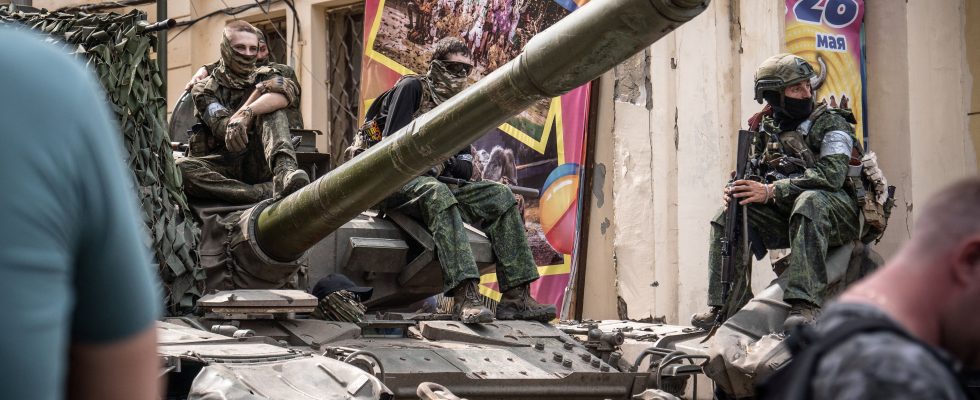An exile that worries European and NATO leaders. According to Polish President Andrzej Duda, who was in Kiev on Wednesday June 28 with his Lithuanian counterpart, 8,000 Wagner group fighters (out of around 25,0000) have now been transferred to Belarus. “Difficult for us to exclude that the presence of the Wagner group in Belarus could pose a threat,” he said. After the aborted rebellion of the mercenary group in Russia earlier this week, Vladimir Putin had left the soldiers a choice: to return home, join the army or go to Belarus, an allied country where their boss Yevgueni Prigojine went into exile. To attack Ukraine in February 2022, Russian armor had passed through Belarus, ever closer to Russian power.
The concerns of European presidents were joined by those of NATO Secretary General Jens Stoltenberg, who warned against any “threat” that Wagner’s presence in Belarus, bordering Poland, Lithuania and Latvia, three member countries of the Alliance. Belarusian President Alexander Lukashenko announced that the tempestuous boss of Wagner, who had disappeared since the announcement of the end of his rebellion on Saturday evening, after 24 hours of chaos which had seen his men seize military bases and march on Moscow before suddenly turning around, had arrived in the republic on Tuesday.
Putin “didn’t doubt” the Russian people
Russian President Vladimir Putin said on Wednesday “he had no doubts” of Russian support during Wagner’s armed rebellion last week, which sparked the country’s worst crisis since he came to power more than 20 years ago. “I did not doubt the reaction of people in Dagestan and throughout the country,” he said in an interview with the head of this republic in southern Russia, according to an extract broadcast by the Russian state television. Moments earlier, Sergei Melikov, the head of the republic of Dagestan, had assured the Russian leader that “there is not a single person in Dagestan who would not have supported the decisions of the leaders of the Russian Federation , which were adopted on June 24, the day of the uprising.
Civilian death toll rises in Kramatorsk
The death toll from Russian strikes that destroyed a restaurant in the large Ukrainian city of Kramatorsk (east of the country) has risen to twelve dead, including three children. A new body was found Thursday, June 29 in the morning in the rubble, while the emergency services count 60 injured. Ukrainian President Volodymyr Zelensky denounced a “terrorist” attack, and announced the arrest of an individual who allegedly coordinated the attack.
According to police, Russia fired two S-300 missiles on Tuesday (June 27) – surface-to-air missiles it also uses for land strikes – at Kramatorsk. The strike destroyed the Ria Pizza restaurant, a downtown establishment popular with journalists, aid workers and soldiers. The Russian Defense Ministry claimed to have struck a “temporary deployment point” of the 56th Mechanized Infantry Brigade of the Ukrainian Armed Forces, and Kremlin spokesman Dmitry Peskov assured that Russia “does not strike civil infrastructure”.
An important railway hub and home to military sites, Kramatorsk, which had 150,000 inhabitants before the war, is very regularly targeted by Russian bombardments. The deadliest was that of the train station, struck in April 2022, which left 61 dead and more than 160 injured a few weeks after the start of the Russian invasion and when a crowd of civilians tried to leave the city.
The counter-offensive continues
At the same time, the commander-in-chief of the Ukrainian forces Valery Zaluzhny assured that five days after the failed rebellion of the paramilitary group Wagner against Moscow, the counter-offensive in Kiev was following its course and recording “progress”. “The enemy is putting up strong resistance, but at the same time suffering heavy losses,” he said in a Telegram message after a phone call with his American counterpart Mark Milley, as the effects on the military situation and on Russian power the events of the last few days in Russia are at the center of all questions.
As for the destabilizing effects of the Wagner rebellion, a lot of people speculate whether it’s over (or not), we don’t know either,” German Chancellor Olaf Scholz said. , who said on Wednesday that he had “no doubts” of Russian support, comes out “weakened” from the crisis.According to Joe Biden who spoke on Wednesday, the Russian president is now “a pariah across the planet”. on a possible weakening of Vladimir Putin, the American president replied: “It’s hard to say, but he is clearly losing the war.”
